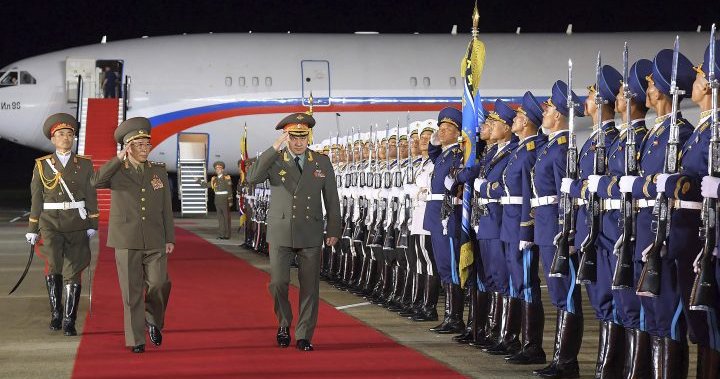This week, Russia and China are sending government delegations to North Korea to participate in events commemorating the 70th anniversary of the armistice that ended the Korean War. These visits indicate that North Korea is gradually emerging from its pandemic-induced isolation and is keen to highlight its partnerships with authoritarian neighbors in the face of escalating nuclear tensions with the US, South Korea, and Japan.
According to North Korea’s state media, a Russian delegation led by Defense Minister Sergei Shoigu arrived in Pyongyang on Tuesday evening, where they were warmly welcomed by senior North Korean officials, including Defense Minister Kang Sun Nam. The Russian Defense Ministry confirmed that Shoigu held a meeting with Kang to strengthen cooperation between their defense departments. Russian media footage showed Shoigu and other officials laying wreaths at a Soviet war monument and paying their respects to statues of North Korean leaders Kim Il Sung and Kim Jong Il.
Additionally, China’s ruling Communist Party is sending a midlevel official named Li Hongzhong, with the aim of restoring exchanges between the two allies. North Korea has been preparing grand celebrations for the anniversary, which are expected to culminate in a military parade in Pyongyang. It is anticipated that Kim Jong Un may showcase the country’s most powerful, nuclear-capable missiles, targeting neighboring rivals and the US.
Kim, accompanied by top defense and foreign policy officials, visited cemeteries to honor fallen soldiers, including Chinese troops who fought alongside North Korea during the war. Expressing gratitude for their sacrifice, Kim referred to these soldiers as “martyrs” and praised their everlasting impact on the Korean people.
The Korean War, initiated by North Korea’s unsuccessful attempt to conquer its southern rival, ended with an armistice but no peace treaty. The border between the Koreas remains highly tense, and North Korea still celebrates the armistice as a victory in the “Grand Fatherland Liberation War.” The conflict involved forces from China and the Soviet Union, supporting North Korea, and South Korea, the US, and UN troops, defending against the invasion.
These visits by Russian and Chinese delegations mark only the second time since the start of the pandemic that foreign government officials have been invited to enter North Korea. The first instance was the arrival of China’s ambassador to Pyongyang in March. North Korea initially imposed a self-imposed lockdown to protect its fragile healthcare system, but it has gradually reopened trade with China to revive its struggling economy.
Experts speculate that North Korea might intensify its weapons tests around the armistice anniversary in response to US military exercises with South Korea. North Korea has conducted several missile firings recently, perceived as a protest against the US’s show of force in the region. The country has been enhancing its nuclear-capable weapons arsenal, viewing it as crucial for its survival.
North Korea has also aligned itself with Russia regarding the war in Ukraine, denouncing the “hegemonic policy” of the US-led West and asserting that Moscow is taking military action to protect its security interests. The Biden administration has accused North Korea of supplying arms to Russia for their conflict in Ukraine, although North Korea denies these allegations. Both Russia and China have been obstructing US efforts to strengthen UN Security Council sanctions against North Korea due to its missile tests.
When questioned about China and Russia’s support for North Korea during the visits, a spokesperson from the US State Department called for Beijing and Moscow to play a more constructive role in defusing tensions and encouraging North Korea to engage in dialogue. The spokesperson emphasized the importance of refraining from threatening and unlawful behavior, which could escalate tensions in the region.
Li Hongzhong, the Chinese official visiting North Korea, holds a high-level position in the ruling Communist Party. Although his visit signifies Chinese support, it does not indicate unequivocal backing for North Korea during this ambiguous period of relations. China, despite participating in UN sanctions against North Korea, remains North Korea’s primary economic and political ally. China is committed to preventing the collapse of the Kim regime to avoid unpredictable consequences such as a refugee crisis, the control of nuclear weapons, and the presence of South Korean and American troops along its border.
Past years have seen visits between Kim and Chinese leader Xi Jinping, aimed at leveraging their ties to gain concessions on regional security arrangements from the US and its allies. However, these exchanges ceased when North Korea closed its borders to contain the spread of COVID-19.
In conclusion, the delegations from Russia and China visiting North Korea for the armistice anniversary events signify North Korea’s gradual reemergence and its desire to showcase partnerships with authoritarian neighbors. These visits could pave the way for enhanced cooperation and dialogue, although tensions in the region remain high.
Denial of responsibility! VigourTimes is an automatic aggregator of Global media. In each content, the hyperlink to the primary source is specified. All trademarks belong to their rightful owners, and all materials to their authors. For any complaint, please reach us at – [email protected]. We will take necessary action within 24 hours.


